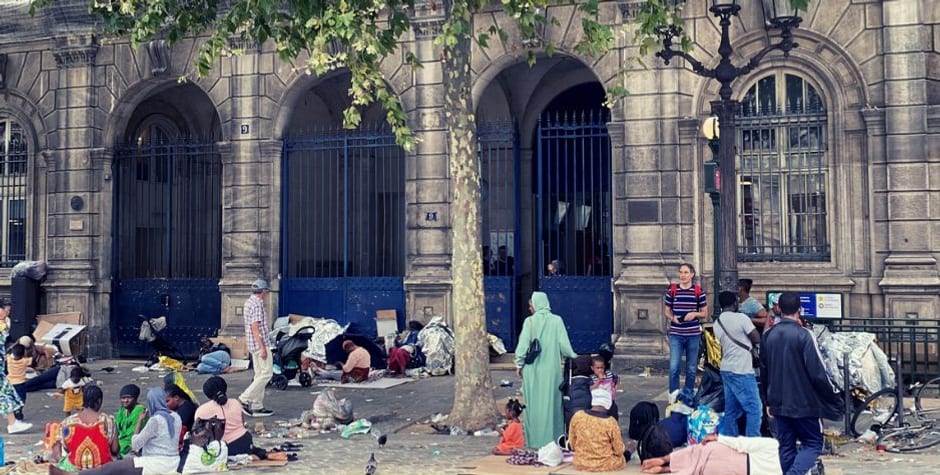

New Developments in the EU’s “New Pact” on Migration and Asylum Reform
About the EU New Pact on Migration
June 2023 has seen significant developments in the European Union’s (EU) collective migration and asylum policy. This topic has been at the forefront of the EU’s mind since 2015, when 1.3 million individuals sought asylum in Europe following the war in Syria.[2] On June 8 of this year, the European Council reached a new agreement (dubbed the “New Pact”) on migration and asylum-seeking reform.[3] This article explores what details are currently available about the June 8 agreement and its likely effects on member states. What are the next steps the EU is taking to reform its policies on asylum and migration?
The June 8 Meeting: Two New Policy Agreements and a Controversial New Mechanism
Although the EU has not officially published a text for the meeting, certain key details have been released to the public.[4] After considerable debate, the European Council approved two new policies: the Asylum Procedure Regulation (APR) and the Asylum and Migration Management Regulation (AMMR).[5] The APR establishes a standard procedure across Europe for processing asylum applications that clearly states the rights and obligations of asylum-seekers.[6] It also creates mandatory border procedures that are designed to quickly evaluate if apprehended migrants are likely to be accepted if they apply.[7] The AMMR will replace the current Dublin regulation that determines which state is in charge of processing a particular applicant; the new policy is meant to expedite this process and provide more consistent rules on examining asylum claims and dealing with secondary movements by migrants.[8]
The most interesting development of the June 8 agreement, however, is the proposal for a new mandatory solidarity mechanism.[9] Solidarity is often a coded word for relocation: it refers to policies that aim to more equally share the burden of housing migrants among EU member states, which otherwise falls disproportionately on southern EU states. Since migrants typically come through the Mediterranean, it is usually Greece, Italy, and Spain that house more migrants than the rest of Europe.[10] Accordingly, those countries often push for measures that require other states to take in more migrants, such as this new mechanism. The novelty of this specific solidarity mechanism is that it provides multiple ways for a state to meet solidarity requirements.[11] States have three options under this new mechanism: accepting the full quota of migrants (currently set at 30,000 a year), paying €20,000[12] for every migrant they do not accept, or providing operational support (like volunteers or infrastructure) to states processing migrants.[13]
The reactions to this new mechanism have varied considerably. Hungary and Poland, for instance, objected to the mechanism and declared that it punishes countries that refuse migrants.[14] Both countries were the only two in the Council to vote against the New Pact, which was passed by a qualified majority vote (with four other members abstaining).[15] Other observers, however, have argued that this mechanism does not solve the problem of Southern states housing a disproportionate number of migrants. These observers speculate that €20,000 is too low of a number to persuade countries to accept additional migrants.[16] They look at examples like Ireland, which recently agreed to pay €1.5 million to avoid intaking 350 new migrants.[17]
What Does the Future Hold?
According to a timeline posted by the European Commission, the June 8 meeting addressed the last two topics the EU planned to address on the issue of migration and asylum-seeking.[18] Negotiations have been ongoing since September 2020, when the New Pact was proposed, but the AMMR issue was the last topic listed on the New Pact timeline.[19] While the EU has now addressed all migration issues, discussions on the Pact’s details continue.[20] On June 29-30, the EU discussed migration, and, as before, Hungary and Poland opposed the solidarity mechanism.[21] Some spectators fear the rise of a divisive rift between Poland and Hungary against the other member states, but the consequences of this rift remain unclear.[22] Since the EU does not want to set a precedent of allowing exceptions for member states, it will likely hold Poland and Hungary to the standards of the June 8 solidarity mechanism.[23] Although the EU developed the solidarity mechanism, the European Commission and the European Parliament have yet to finalize it.[24]
Full negotiations concerning how the EU will address migration—including whether it will accept the solidarity mechanism—are expected to end in February of 2024.[25] Following the negotiations between member states in the EU, trialogue negotiations between the Commission and the Parliament “will begin immediately to reach an agreement by Spring 2024.”[26] It is unclear what the final agreement will look like between the Commission and the Parliament. Still, on June 8, the EU stated that it “welcomes the political agreement” between the member states and “stands ready to work with the European Parliament and Council.”[27] All parties plan to adopt a final version of the EU migration agreement and the obligations it will place on member states in April of 2024.[28] The expected 2024 agreement will likely hold member states to the standards set in the solidarity mechanism: requiring them to accept migrants, pay for those they refuse to accept, or provide operational support. It is doubtful whether any state can refrain from the solidarity mechanism, even if states like Hungary and Poland fundamentally oppose it.
Poland’s opposition arises from the current number of displaced Ukrainians that it is already housing; the Prime Minister argues it is unfair to force the country to either pay or accept immigrants considering the country’s current migratory pressures.[29] Hungary, on the other hand, is opposed to being pressured to accept or subsidize migrants against the wishes of its people and government.[30] Polish Prime Minister Mateusz Morawiecki’s statement epitomizes the frustrations some feel regarding the migration agreement, “[f]orced relocation does not solve the problem of migration, but it violates the sovereignty of the Member States.”[31] While the agreement may help evenly distribute those migrating to the EU, it will force member states to participate against their will without truly addressing the causes of increased immigration in Europe. The agreement serves as a band-aid, not a solution.
____________
[1] That is, the month of June, 2023.
[2] Laura Fletcher, EU’s ‘Historic’ Asylum Seeker Hosting Deal Explained, RTÉ (June 9, 2023 22:34), https://www.rte.ie/news/2023/0609/1388334-luxembourg-explainer/.
[3] Albert-Horst Neidhardt, One step closer to getting the EU Migration Pact done. One step closer to ambitious change?, European Policy Centre, 4 (June 13, 2023), https://www.epc.eu/content/PDF/2023/EUMigrationPact_DP_v3.pdf.
[4] Gregorio Sorgi & Jacopo Barigazzi, What’s Actually in the EU’s Migration Deal?, POLITICO (June 10, 2023 4:02 CET), https://www.politico.eu/article/eu-migration-deal-asylum-seekers-relocation/.
[5] Justice and Home Affairs Council, 8-9 June 2023, European Council (last rev.’d July 7, 2023), https://www.consilium.europa.eu/en/meetings/jha/2023/06/08-09/.
[6] Migration Policy: Council Reaches Agreement on Key Asylum and Migration Laws, European Council (June 8, 2023, 22:50), https://www.consilium.europa.eu/en/press/press-releases/2023/06/08/migration-policy-council-reaches-agreement-on-key-asylum-and-migration-laws/.
[7] Id.
[8] Id. Secondary movements are when a migrant moves from the country they arrive in Europe
[9] Id.
[10] Italy, for example, has had over 76,000 sea arrivals in 2023. Operations Data Portal, Refugee Situations: Italy, UNCHR, https://data.unhcr.org/en/situations/mediterranean/location/5205, (last visited July 7, 2023).
[11] The abstaining countries were Malta, Lithuania, Bulgaria, and Slovakia. Italy flipped to supporting the New Pact in a dramatic last-second move. Neidhardt, supra note 2, at 5.
[12] Equivalent to $21,400. The receiver of this money is still being negotiated, but options include the countries taking in immigrants or the countries migrants leave behind (so to better incentivize staying). Id.
[13] Id.
[14] Lisa O’Carroll, EU Agrees Radical Reform on Migration and Asylum Laws, THE GUARDIAN (June 9, 2023 12:07 BST), https://www.theguardian.com/world/2023/jun/08/eu-agrees-radical-reforms-migration-asylum-laws.
[15] Neidhart, supra note 2, at 4.
[16] See generally Neidhart, supra note 2; Fletcher, supra note 1.
[17] Paul Cunningham, Cabinet Agrees to €1.5m EU Payment over Asylum Seekers, RTÉ (June 8, 2023, 20:27), https://www.rte.ie/news/politics/2023/0608/1388005-cabinet-meeting/.
[18] Eur. Comm’n, What is the New Pact on Migration and Asylym of the EU? (last visited July 17, 2023), https://home-affairs.ec.europa.eu/policies/migration-and-asylum/new-pact-migration-and-asylum_en.
[19] Id.
[20] Id.
[21] Associated Press, EU Leaders Resume Migration Talks, VOA (June 30, 2023, 5:22 AM), https://www.voanews.com/a/eu-leaders-resume-migration-talks/7161460.html.
[22] Id.
[23] Id.
[24] Neidhardt, supra note 2, at 5.
[25] Eur. Comm’n, Supra note 1.
[26] Neidhardt, supra note 2, at 5.
[27] Eur. Comm’n, Statement on the political agreement on the New Pact on Migration and Asylum, (last visited July 17, 2023), https://ec.europa.eu/commission/presscorner/detail/en/statement_23_3183.
[28] Eur. Comm’n, Supra note 1.
[29] Reuters, Polish PM to oppose migration deal at EU summit, Thomson Reuters (June 29, 2023, 11:05 AM), https://www.reuters.com/world/europe/polish-pm-says-he-will-present-plan-bordersecurity-eu-summit-2023-06-29/#:~:text=%22No%20to%20forced%20relocation%20of,more%20effectively%20with%20people%20smugglers.
[30] AFP, Hungary Says EU Refugee Reform Deal 'Unacceptable', Radio Free Europe/Radio Liberty (Jun. 9, 2023), https://www.rferl.org/a/hungary-eu-refugee-reform-deal/32451830.html.
[31] Mateusz Morawiecki, TWITTER, (Jun. 9, 2023, 11:44 AM), https://twitter.com/MorawieckiM/status/1667105469012295681.













